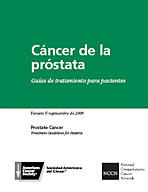December 5, 2005. — University of North Carolina at Chapel Hill scientists have identified a molecule that stimulates the aggressive growth of prostate cancer.
The molecule, Ack1, a member of the growth-promoting tyrosine kinase gene family, stimulates tumor formation in part by signaling prostate cells to rid themselves of a tumor-suppressor protein. Normally, this suppressor protein would inhibit rapid cell growth by signaling the cell to destroy itself.
A report on the study, which appeared Nov. 15 in the journal Cancer Research, also points to Ack1 as a potential target for developing novel drugs against prostate cancer.
The study's senior author, Dr. Shelton Earp, directs the UNC Lineberger Comprehensive Cancer Center and is Lineberger professor of cancer research and a professor of pharmacology and medicine.
Tests of Ack1 demonstrate a profound effect on tumor growth in experimental systems, Earp said. "It's a remarkable effect. Tumors grew more rapidly and invaded as if they were converted to advanced prostate cancer."
Another major finding of the study involved an experimental drug developed by the National Cancer Institute, called geldanamycin. In laboratory tests, the UNC Lineberger group found Ack1 activity could be inhibited through interference with its molecular interactions, thus offering a target for treatment. First, the group discovered that Ack1 bound to a protein called Hsp90 (heat shock protein 90), which associated with many oncogenic, or cancer-causing, signaling proteins.
"If you add geldanamycin to the prostate cancer cell, the drug knocks Hsp90 off oncogenic signaling molecules. This dramatically decreases Ack1 activity and slows tumor formation," Earp said.
In addition, the team compared Ack1 activation in advanced prostate cancer tissue from patients with that found in benign prostatic hypertrophy (BPH), or non-cancerous prostate enlargement. The team showed the levels of the activated Ack1 to be much higher in the advanced tumors.
In earlier work, Earp's UNC laboratory was the first to clone a cell surface tyrosine kinase, Mer.
"We saw that Mer was expressed at reasonably high levels in prostate cancer cells. And so Dr. Nupam Mahajan, the study's first author, decided to look at whether Mer had an effect on prostate cancer growth signaling," Earp said.
In experiments, which used the university's Michael Hooker Proteomics Core Facility, the team discovered that Mer activated Ack1. This finding led to the current study.
"Because we found Ack1 is more active in advanced prostate tumors, and its inhibition blocks experimental tumor growth, we believe Ack1 should be a target for novel drug development."
Sources & Links
Activated Tyrosine Kinase Ack1 Promotes Prostate Tumorigenesis: Role of Ack1 in Polyubiquitination of Tumor Suppressor Wwox Nupam P. Mahajan, Young E. Whang, James L. Mohler, and H. Shelton Earp. Lineberger Comprehensive Cancer Center, Department of Medicine and Pharmacology, and Departments of Surgery and Pathology and Laboratory Medicine, University of North Carolina at Chapel Hill, Chapel Hill, North Carolina and Department of Urologic Oncology, Roswell Park Cancer Institute, New York State University at Buffalo, Buffalo, New York.
Follow up:
ACK1 Is a Trigger Advanced Prostate Cancer Recurrence May 9, 2007

 Pomegranate Juice Slows PSA Rise in men With Recurrent Prostate Cancer After Surgery, Radiation
Pomegranate Juice Slows PSA Rise in men With Recurrent Prostate Cancer After Surgery, Radiation


